 GE APPLIANCE
GE APPLIANCE
DigitalTHERMOSTAT
IMPORTANT SAFETY INFORMATION
READ ALL INSTRUCTIONS BEFORE USING
![]() WARNING
WARNING
FIRE AND SHOCK HAZARD
- Always turn off power at the main power supply before installing, cleaning, or removing the thermostat. Failure to do so could result in an electrical shock hazard.
- Do not use voltages over 30 VAC. Higher voltages will damage the thermostat and could cause shock or fire hazards.
NOTICE
- All wiring must conform to local and national electrical and building codes.
- Use this thermostat only as described in this manual.
Specifications
Electrical rating:
- 24 VAC (18–30 VAC)
- 1 amp maximum per terminal
- 4 amp maximum total load
Operating temperature range: 40°F–99°F (4°C–37°C)Temperature set range: 60°F–85°F (15°C–29°C)Accuracy: ± 1°F (± 0.5°C)
System configurations:
- Factory Setting: 2-stage heat (heat pump/resistance heat), 1-stage cool, 2-speed fan
- Alternate Setting: 1-stage heat (resistance heat), 1-stage cool, 2-speed fan
Terminations: R, C, W, Y, GH, GL, BWiring: Maximum wiring length is 66ft (20 meters) for AWG18Maximum wiring length is 60ft (18 meters) for AWG20
INTRODUCTION OVERVIEW
THERMOSTAT CONTROLS
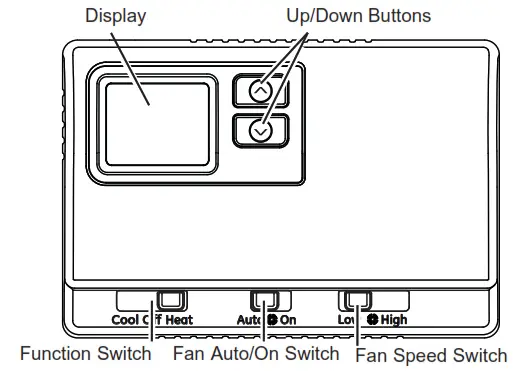
THERMOSTAT BASE LAYOUT
INSTALLATION INSTRUCTIONS
 WARNINGELECTRICAL SHOCK HAZARD—Turn off the power by unplugging the unit or by removing the fuse or switching the appropriate circuit breaker to the OFF position before removing the existing thermostat. Failure to do so could result in a risk of electric shock.
WARNINGELECTRICAL SHOCK HAZARD—Turn off the power by unplugging the unit or by removing the fuse or switching the appropriate circuit breaker to the OFF position before removing the existing thermostat. Failure to do so could result in a risk of electric shock.
PACKAGE CONTENTS/TOOLS REQUIREDPackage includes: Thermostat base, thermostat cover, wiring labels, screws, and wall anchors.Tools needed: and putty.
TO REMOVE THE EXISTING THERMOSTAT
- Turn off power to the heating and cooling system by removing the fuse or switching off the appropriate circuit breaker.
- Remove the cover of the old thermostat. This should expose the wires.
- Label the existing wires with the enclosed wire labels before removing wires.
- After labeling wires, remove wires from wire terminals.
- Remove existing thermostat base from wall.
- Refer to the following section for instructions on how to install this thermostat.
TO REMOVE THE EXISTING THERMOSTAT
- Turn off power to the heating and cooling system by removing the fuse or switching off the appropriate circuit breaker.
- Remove the cover of the old thermostat. This should expose the wires.
- Label the existing wires with the enclosed wire labels before removing wires.
- After labeling wires, remove wires from wire terminals.
- Remove existing thermostat base from wall.
- Refer to the following section for instructions on how to install this thermostat.
TO INSTALL THERMOSTAT
IMPORTANT: Thermostat installation must conform to local and national building and electrical codes and ordinances.NOTE: Mount the thermostat about five feet above the floor. Do not mount the thermostat on an outside wall, in direct sunlight, behind a door, or in an area affected by a vent or duct.
- Turn off power to the heating and cooling system by removing the fuse or switching off the appropriate circuit breaker.
- Move the Function switch on the thermostat to Off.
- Remove the cover by inserting and twisting a coin or screwdriver in the slots on the top of the thermostat.
- Put the thermostat base against the wall where you plan to mount it. Make sure wires will feed through the wire opening in the base of the thermostat.
- With the base level, mark the placement of the mounting holes.
- Set thermostat base and cover away from the working area.
- Using a 3/16″ drill bit, drill holes in the locations you have marked for mounting. have marked for mounting.
- Use a hammer to tap supplied anchors in mounting holes.
- Align thermostat base with mounting holes and feed the control wires through the wire opening
- Seal holes for wires behind the thermostat with non-flammable insulation or putty, or use a wall plate obtainable from local hardware or home building store.
- Use supplied screws to mount the thermostat base to the wall.
- Insert stripped, labeled wires in matching wire terminals by pressing on the corresponding terminal contact. See the “Wiring Diagrams” section of this manual.NOTICEMake sure the exposed portion of wires does not touch other wires.
- Gently tug wire to be sure of the proper connection. Double-check that each wire is connected to the proper terminal.
- Replace the cover on the thermostat by snapping it in place.
- Plug the unit in or turn on the power to the system at the main service panel.
- Test thermostat operation as described in the “Testing the Thermostat” section.
WIRING DIAGRAMS
Table 1: Terminals for six wires 1-stage heat/1-stage cool system
| B | GL | GH | Y | W | C | R |
| NDOOR FAN-LOW | INDOOR FAN-HIGH | COMPRESSOR | HEAT ELECTRIC | 24 VAC COMMON | 24 VAC HOT |
Table 2: Terminals for seven wires 2-stage heat/1-stage cool system
| B | GL | GH | Y | W | C | R |
| REVERSING VALVE (HEAT ACTIVE) | INDOOR FAN-LOW | INDOOR FAN-HIGH | COMPRESSOR | AUXILIARY HEAT-ELECTRIC | 24 VAC COMMON | 24 VAC HOT |
CONFIGURATION MODE
The configuration mode is used to set the RAK149F2 to match the PTAC’s heating/cooling system. The default setting of this thermostat is for 1-stage cooling with a 2-stage heat pump system. To configure for a 1-stage cooling with a 1-stage heating,see #2 in the Configuration Mode Settings below. To configure the RAK149F2, perform the following steps:
Note: The operation being set will blink in the display.
- Slide the Function switch to the OFF position.
- Remove the thermostat’s front cover.
- To enter the configuration mode, simultaneously hold theLEFT and RIGHT buttons in for 3 seconds while the thermostat is in OFF mode. (See diagram on page 3.)
- Once in the configuration mode, press the or button to change settings within each screen.– Press the RIGHT button to advance to the next screen.– Press the LEFT button to return to the previous screen.NOTE: To exit configuration mode at any time, slide the Function switch to Heat or Cool.
Configuration Mode Settings
The setup screens for Configuration Mode are as follows:
- Temperature Scale (°F or °C)—Choose Fahrenheit or Celsius. Press the ∨ or ∧ button to select. Press the RIGHT button to advance to the next screen.
 NOTE: Default factory setting is Fahrenheit.
NOTE: Default factory setting is Fahrenheit. - Heat System—Check the model number on the GE PTAC chassis to determine the primary heating method.AZ65H/95H***** are heat pumps and are the thermostat factory setting.AZ45E/95E***** are electric heat models and will require a mode setting change.To change the heating mode configuration, press the RIGHT button to advance to the HSH screen. Press the or button to select the HSE screen. Press the RIGHT button to advance to the next screen.
- Temperature Differential—Stage 1—(1–9°F) (1–5°C) Set the number of degrees between the “setpoint” temperature and the “turn on” temperature for the first stage.
 Press the ∨ or ∧ button to set differential value. Press the RIGHT button to advance to the next screen.Note: Default factory setting is 2°F/1°C for each stage.
Press the ∨ or ∧ button to set differential value. Press the RIGHT button to advance to the next screen.Note: Default factory setting is 2°F/1°C for each stage. - Temperature Differential—Stage 2 (1–9°F/1–5°C) Heat Pump (HSH) onlySet the number of degrees between when stage 1 turns on and stage 2 turns on. Press the ∨ or ∧ button to set differential value. Press the RIGHT button to advance to the next screen.Note: Default factory setting is 2°F/1°C for each stage.
- Minimum Cool Setpoint (60, 64, 66, 68, 70, 72, 74, 76°F) (15, 17, 19, 20, 21, 22, 23, 24°C)
 Adjust to control the minimum Cool set temperature allowed. Press the or button to select. Press the RIGHT button to advance to the next screen.Note: Default factory setting is 60°F/15°C.
Adjust to control the minimum Cool set temperature allowed. Press the or button to select. Press the RIGHT button to advance to the next screen.Note: Default factory setting is 60°F/15°C. - Maximum Heat Setpoint (65, 70, 72, 74, 76, 78, 80, 85°F) (18, 21, 22, 23, 24, 26, 27, 29°C)
 Adjust to control the maximum Heat set temperature allowed. Press the or button to select.Press the RIGHT button to advance to the next screen.Note: Default factory setting is 85°F/29°C.
Adjust to control the maximum Heat set temperature allowed. Press the or button to select.Press the RIGHT button to advance to the next screen.Note: Default factory setting is 85°F/29°C. - Room temperature offset (+9°F to –9°F) (+5°C to –5°C) Adjust to calibrate displayed room temperature to match the actual room temperature. Press the or button to select. Press the RIGHT button to advance to the next screen.Note: Default factory setting is 0°F/0°C.
OPERATING FUNCTIONS
Off
- In this mode, the thermostat will not turn on the heating or cooling devices (a manual fan can operate).
- Off is also used to access configuration mode.Cool

- In this mode, the thermostat controls the cooling system.
- Press the ∨ or ∧ button to set the desired temperature.Heat

- In this mode, the thermostat controls the heating system.
- Press the ∨ or ∧ button to set the desired temperature
TESTING THE THERMOSTAT
Once the thermostat is installed, it should be thoroughly tested.
NOTICEDo not use air conditioning beyond the simple test when the outdoor temperature is below 50 degrees. This can damage the air conditioning system.Note: Before testing the thermostat, move the Fan Auto/On switch to the Auto position.
Fan Test
- With Function switch set to Off, slideFan Speed switch to High, and slideFan Auto/On switch to On position. Low High

- Indoor fan turns on at high speed.
- Slide Fan Speed switch to Low.

- Indoor fan slows to low speed.
- Slide Fan Auto/On switch to Auto position.
- Indoor fan turns off.
Cool Test
- Slide Function switch to Cool position. Cool mode screen is displayed.
- Adjust the set temperature so it is 5 degrees below room temperature.
- Air conditioning should come on within a few seconds.
- Adjust the set temperature so it is 2 degrees above the room temperature and the A/C should turn off. Note:There is a 3 minute time delay and a 3-minute minimum run time for the compressor when it turns on/off. (On some models, the fan may also have a minimum run time/ off time delay).
Heat Test

- Slide Function switch to Heat position. Heat mode screen is displayed.
- Adjust the set temperature so it is 5 degrees above room temperature.
- Resistance heat should come on within a few seconds.
- Adjust the set temperature so it is 2 degrees below the room temperature and the heat should turn off. Note:There is a 3 minute time delay and a 3-minute minimum run time for the compressor when it turns on/off. (On some models, the fan may also have a minimum run time/ off time delay).
TROUBLESHOOTING TIPS
| Problem |
Solution |
| No Display | Check for 24 VAC; the display is blank when 24 VAC is not present |
| The system fan does not come on properly | Verify that the wiring is correct. |
| All thermostat buttons are inoperative | Verify that 24 VAC is present; the unit will not operate when 24 VAC is not present. |
| The thermostat turns on and off too frequently | Adjust temperature differential
(see Configuration Mode – Setting Temperature Differential, Stage 1 and Stage 2 section). |
| Fan runs continuously | Check Fan Auto/On switch. If set to ON position, fan will run. |
| The room temperature is not correct | Verify that wall hole is plugged with putty or insulation to prevent airflow from the wall cavity. Adjust Temperature Offset (see Configuration Mode – Room temperature offset section). |
| Compressor doesn’t run or turn off im- mediately when changing function or setting | There is a 3 minute time delay and a 3-minute minimum run time for the compressor when it turns on/off. |
| The fan doesn’t run or turn off immediately when changing function or setting | This is normal. On some models, the fan may have a minimum run time/off time delay. |
| Problem not listed above | Press the Reset button once to reset the thermostat and restore all factory settings. |
THERMOSTAT WARRANTY
Staple your receipt here. Proof of the original purchase date is needed to validate the warranty.
For The Period Of GE Appliances Will Replace:
One YearFrom the date of the original purchase
Full Replacement of the thermostat which fails due to a defect in materials or workmanship. For Warranty replacement, contact your distributor.
What GE Appliances Will Not Cover:
- Service trips to your location.
- Improper installation. If you have an installation problem, contact your installer. You are responsible for providing adequate electrical connections to the product.
- Failure of the product resulting from modifications to the product or due to unreasonable use, including failure to provide reasonable and necessary maintenance.
- In commercial locations, the labor is necessary to move the unit, after it has been initially installed, to a location where it is accessible for service by an individual technician; or, if the instructions included in this manual have been disregarded.
- Replacement of location fuses or the resetting of circuit breakers.
- Damage to the product caused by improper power supply voltage, accident, fire, floods, or acts of God.
- Incidental or consequential damage caused by possible defects with this thermostat.
EXCLUSION OF IMPLIED WARRANTIES—Your sole and exclusive remedy is product exchange as provided in this Limited Warranty. Any implied warranties, including the implied warranties of merchantability or fitness for a particular purpose, are limited to one year or the shortest period allowed by law.
This warranty is extended to the original purchaser and any succeeding owner for products purchased for use within the USA and Canada. In Alaska, the warranty excludes the cost of shipping or service calls to your site.
Some states or provinces do not allow the exclusion or limitation of incidental or consequential damages. This warranty gives you specific legal rights, and you may also have other rights which vary from state to state or province to province. To know what your legal rights are, consult your local, state, or provincial consumer affairs office or your state’s Attorney General. Warrantor: GE Appliances, a Haier company Louisville, KY 40225
[xyz-ips snippet=”download-snippet”]

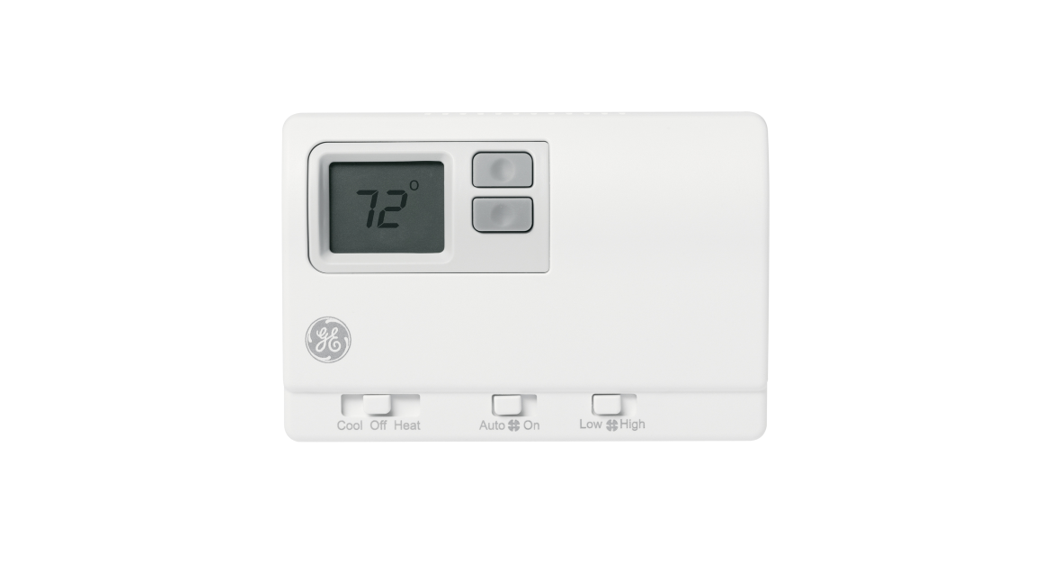
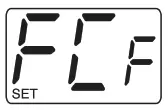 NOTE: Default factory setting is Fahrenheit.
NOTE: Default factory setting is Fahrenheit.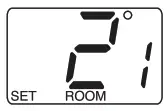 Press the ∨ or ∧ button to set differential value. Press the RIGHT button to advance to the next screen.Note: Default factory setting is 2°F/1°C for each stage.
Press the ∨ or ∧ button to set differential value. Press the RIGHT button to advance to the next screen.Note: Default factory setting is 2°F/1°C for each stage.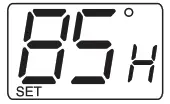 Adjust to control the minimum Cool set temperature allowed. Press the or button to select. Press the RIGHT button to advance to the next screen.Note: Default factory setting is 60°F/15°C.
Adjust to control the minimum Cool set temperature allowed. Press the or button to select. Press the RIGHT button to advance to the next screen.Note: Default factory setting is 60°F/15°C.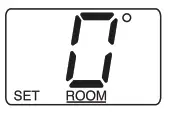 Adjust to control the maximum Heat set temperature allowed. Press the or button to select.Press the RIGHT button to advance to the next screen.Note: Default factory setting is 85°F/29°C.
Adjust to control the maximum Heat set temperature allowed. Press the or button to select.Press the RIGHT button to advance to the next screen.Note: Default factory setting is 85°F/29°C.



